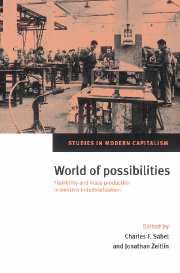Book contents
- Frontmatter
- Contents
- List of contributors
- Acknowledgments
- Stories, strategies, structures: rethinking historical alternatives to mass production
- Part I The modernity of tradition
- Part II The battle of the systems
- 5 Between flexibility and mass production: strategic ambiguity and selective adaptation in the British engineering industry, 1830–1914
- 6 The lost paradigm: an Italian metalworking empire between competing models of production, 1900–1920
- 7 “Have a heart for the manufacturers!”: production, distribution and the decline of American textile manufacturing
- 8 The small-holder economy in Denmark: the exception as variation
- Part III The resurgence of flexible production
- Index
8 - The small-holder economy in Denmark: the exception as variation
Published online by Cambridge University Press: 12 December 2009
- Frontmatter
- Contents
- List of contributors
- Acknowledgments
- Stories, strategies, structures: rethinking historical alternatives to mass production
- Part I The modernity of tradition
- Part II The battle of the systems
- 5 Between flexibility and mass production: strategic ambiguity and selective adaptation in the British engineering industry, 1830–1914
- 6 The lost paradigm: an Italian metalworking empire between competing models of production, 1900–1920
- 7 “Have a heart for the manufacturers!”: production, distribution and the decline of American textile manufacturing
- 8 The small-holder economy in Denmark: the exception as variation
- Part III The resurgence of flexible production
- Index
Summary
The exception as variation
The economic conflicts of the late nineteenth century in Western Europe and the United States look more and more like the clash of two projects of industrial modernity. For most of our own century the tumult of the period was regarded as the death rattle of the local communities of “pre-industrial” or “pre-capitalist” peasants, artisans and shopkeepers overwhelmed by competition with mass-production factories and large-scale farms that dominated world markets through vast transportation networks. Today it seems more accurate to see many of these groups of small holders as advocates of a kind of owner-operated capitalism in which small units of production cooperate in the production of specialized goods. Their production costs were not as low as those of the mass producers. But their products were often still competitive because in many markets customers would pay some premium for a specialized good that satisfied their needs more fully than the standard item.
Correspondingly, the mutualism of Proudhon, the Liberalism of Gladstone and J. S. Mill, the Populism of rural America, and the urban Progressivism of Brandeis, all are being reinterpreted as efforts to define an institutional setting that encouraged cooperation among small holders on the one hand and protected them on the other from large producers who might use their power in financial or product markets against smaller competitors. Indeed, at the end of our century their programmatic emphasis on voluntary cooperation as the precondition of the economic autonomy of individuals and groups seems a prescient criticism of the limits of bureaucratic coordination and accordingly hard to dismiss as an atavistic refusal to own up to the insurmountable advantages of large-scale organization.
- Type
- Chapter
- Information
- World of PossibilitiesFlexibility and Mass Production in Western Industrialization, pp. 344 - 378Publisher: Cambridge University PressPrint publication year: 1997
- 12
- Cited by

